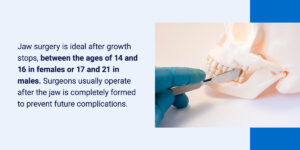Orthognathic surgery
Surgical orthodontics in Duncanville & Grand Prairie, Texas
Orthodontic technology can seamlessly handle multiple jaw issues, although some cases may require surgery to achieve the best results. Henderson Orthodontics arranges orthognathic surgeries to treat patients of all ages. We will create a detailed plan to prep, treat and heal your jaw and smile.
Surgical orthodontics, or orthognathic surgery, involves the mouth, jaw and face. Jaw surgery treats issues that will not respond to other orthodontic treatments. These conditions can either be aesthetic or health-related and result from injury or genetics. Corrective jaw surgery realigns your jawbones so you can easily talk, breathe and perform other functions. Other forms of jaw surgery can include dental implant placement, wisdom teeth removal and biopsies.

Anyone experiencing issues with their jaws or tooth alignment can benefit from orthodontic surgery. Jaw problems can cause people to struggle with otherwise effortless activities like talking, sleeping or chewing. People with facial asymmetries, including congenital disorders, a protruding jaw or unbalanced facial features, could also be good candidates. If you’re considering seeking orthognathic surgery, your first step is to have an orthodontist examine your teeth and jaw. They will be able to identify your issues and inform you whether this surgery will help you achieve your desired results. Most orthodontists will recommend regular orthodontic treatment to solve your issue before turning to surgery. However, while orthodontic treatment may align your teeth, your jaw issues could remain. If this is the case, then orthognathic surgery will be necessary. Jaw surgery is ideal after growth stops, between the ages of 14 and 16 in females or 17 and 21 in males. Surgeons usually operate after the jaw is completely formed to prevent future complications. That way, the patient can avoid further jaw growth affecting the correction made through orthognathic surgery.
Possible Jaw Problems
There are many reasons someone might need orthognathic jaw surgery, including:
- Frequent headaches
- Difficulty biting, chewing or swallowing
- Chronic pain or temporomandibular joint dysfunction (TMJ)
- Breathing issues
- Misalignment
- Open bite
Surgery is a potential treatment for anyone with these issues who cannot benefit from orthodontic treatments. It is best to consult your oral surgeon for jaw surgery to determine whether it is the best option for your case.
If you are considering starting the process of having jaw surgery, it is essential to educate yourself as much as possible. By knowing what jaw surgery can accomplish and all that it involves, you can move forward with more confidence and appropriate expectations. You may have an image in mind of how your face will look after surgery compared to how it looks now. If so, tell your health care providers about those expectations and what you want your jaw surgery to accomplish. Your health care providers will be able to give their recommendations for how to solve your jaw issues. They will also be able to tell you what you should expect should you choose the route of orthognathic surgery. Along with your goals, your doctor will consider your overall health when considering whether you’re a good candidate for jaw surgery. They will determine if surgery can help you achieve your goals or if you should opt for a different or less invasive option.
Finally, it is important to understand that jaw surgery is a long, involved process that usually takes years to complete. Ask your health care provider questions about the jaw surgery process, including things to know before, during and after surgery. As you gain this information, you will be better able to prepare for each step of your jaw surgery journey.
Jaw surgery can provide relief from multiple jaw issues. We will walk you through each phase and keep you comfortable throughout treatment. Here’s what you can expect before, during and after jaw surgery.
Before jaw surgery
There’s plenty of preparation and pre-work that you must accomplish before your jaw surgery. Your doctor will use the following methods to acquire as much information as possible:
- X-rays
- Photographs of your jaw and teeth
- Teeth scans and computed tomography scans
- Impressions of your teeth
You may also need orthodontic treatment before your jaw surgery to prepare your teeth and mouth for the upcoming changes to your jaw. Your orthodontist may recommend braces or removing certain teeth. Before your surgery, you must avoid eating or drinking anything for the length of time your doctor tells you. You’ll be on a liquid-only diet after your surgery, so you will need to prepare by stocking up on nutrition drinks, milk, soup and other liquid food items.
During jaw surgery
During the procedure, your oral and maxillofacial surgeon will make incisions and adjust your jaw. The process will change depending on your needs, but you can talk to your surgeon to learn more about your case.
After jaw surgery
After surgery, you will experience some pain and swelling. Use an ice pack to help with swelling and discomfort during the first day after your surgery. The initial healing period is about six weeks, but it can take up to 12 weeks or longer to heal completely. We recommend taking two weeks off of school or work to rest. After surgery, you’ll have a plastic splint in your mouth that will help your muscles adjust to your new jaw position. Be sure to wear your splint at all times except when eating a meal or cleaning your teeth. You will most likely need orthodontic treatment after your surgery. This treatment will ensure your teeth stay straight and help you experience the best long-term results.
Henderson Orthodontics has helped people learn to love their smiles for years. Our team consists of friendly office staff and Dr. Marlon Henderson. Our staff will make you feel at home during each appointment. Dr. Henderson is certified by the American Board of Orthodontics (ABO), which ensures quality orthodontic services for patients nationwide. Our plans include flexible financing options, so more people have access to quality orthodontic treatment. Outside of our orthodontic work, we like to give back to our community as much as possible.

